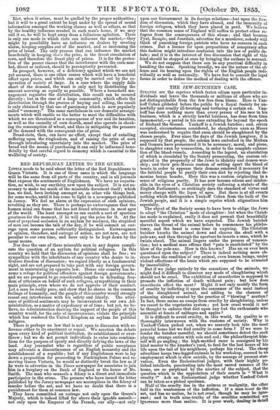RED REPUBLICAN LETTER TO THE QUEEN Lir= needs to be
said about the letter of the Red Republicans to Queen Victoria. It is one of those oases in which the language will be the same from all parts of the country, and in all journals that express the sentiments of Englishmen. We have no expecta- tion, no wish, to say anything new upon the subject. It is not ne- cessary to make too much of the miserable document itself; which has, we find, been lurking amongst us, as other vile things lurk, for some weeks, until it has come to light in a newspaper published in Jersey. We feel no alarm at the expression of such opinions, revolting as they are. There is perhaps no extravagance that the human mind can frame that has not found utterance in most ages of the world. The least amongst us can snatch a sort of spurious greatness for the moment, if he will pay the price for it. At the cost of perpetual seclusion in an asylum for madmen, the stupidest of men can become the talk of the day, if he will commit an out- rage upon some person sufficiently distinguished. Extravagance of opinion, therefore, and outrage of action, are not new, are not peculiar to our own time, and have only to be kept down by the usual means.
Nor does the ease of these miserable men in any degree compli- cate the question of an asylum for political refugees. In this country we hold that the discussion of opinions shall be free ; we sympathize with the inhabitants of any country who desire to in- troduce freedom of discussion ; we regard liberty as a fundamental right, and are not prepared to take part with any foreign govern- ment in maintaining an opposite law. Hence our country has be- come a refuge for political offenders against foreign governments ; and we are prepared to go considerable lengths in defending free- dom of utterance on behalf of such refugees, sympathizing in their main principle, even where we do not approve of their conduct. Let a man be really pure, and show that he shares in the common feelings of humanity, and the people of this country would strongly resent any interference with his safety and liberty. The utter- ance of political sentiments may be inconvenient to our own Ad- ministration, as a matter of expediency or of time; but yet, we be- lieve, no Administration desiring the support of the people of this country would, for the sake of inconvenience, violate the principle which has rendered the United Kingdom an asylum for political refugees. There is perhaps no law that is not open to discussion with re- ference either to its enactment or repeal. We sanction the debate upon every kind of political institution, its establishment or over- throw ; but we do not permit individuals to enter into combina- tions for the purpose of openly and directly defying the laws of the land. Any journalist who is regardless of public acceptance may advocate a discontinuance of an English monarchy and the establishment of a republic ; but if any Englishman were to lay down a proposition for proceeding to Buckingham Palace and re- moving Queen Victoria, he would as distinctly break the law as if he were to advertise in the Times newspaper for associates tojoin him in a burglary on the Bank of England or the house of Mr. Smith. The man who counsels a felony is a direct and immediate participator in the crime. The persons who have issued the letter published by the Jersey newspaper are accomplices in the felony of murder before the act, and we have no doubt that there is a punishment for them at common law. They have committed an outrage not only upon the Queen's Majesty-, which is indeed lifted far above their ignoble assault— not only upon the Emperor of the French, our ally—not only upon our Government in its foreign relations—but upon the free- dom of discussion, which they have abused, and the immunity of foreign refugees, which they have placed in peril. We believe that the common sense of England will suffice to protect other re- fugees from the consequences of this abuse ; and that because Pyat, Rouge, and Jourdain, advertise for a murderer, nobody will think of punishing foreign patriots who have no concern in such crimes. But a licence for open propositions of conspiracy after this fashion might introduce confusion into the law of public de- bate ; and it is in the interest of free discussion that right of this kind should be stopped at once by bringing the authors to account.
We do not suppose that there can be any practical difficulty in handling the case. Speaking broadly, we see the nature of the of- fence and its bearing upon the rights of the English people indi- vidually as well as nationally. We have but to consult the legal forms in order to define the method of dealing with the offence.


































 Previous page
Previous page